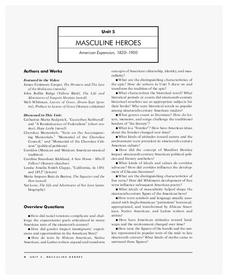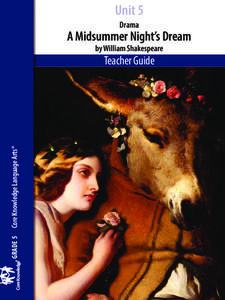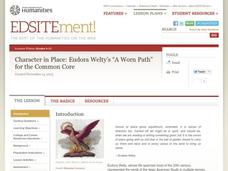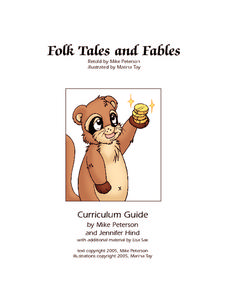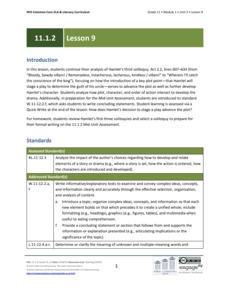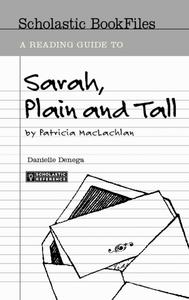EngageNY
Analyzing Plot Development across Flush
The end. Scholars discuss how the end of the text in Flush contributes to the plot development of the story. They then write book reviews to share their thoughts about the story. After finishing their book reviews, learners share them...
Scholastic
A Reading Guide to A Wrinkle in Time
Accompany a reading of Madeleine L'Engle's classic tale, A Wrinkle in Time, with a detailed guide equipped with 15 informative and useful chapters. Scholars discover who the author is, why she wrote the book, and crucial story elements...
EngageNY
Revising for Organization: Timely Transitions
During the eighth lesson in a historical fiction unit, pupils practice thoughtfully transitioning their ideas sequentially. After the teacher models how to add these transitions using the Wheelwright draft created in a previous lesson,...
Teach with Movies
Teaching Students to Write a Narrative
Encourage narrative writing with a clever exercise. Class members watch episodes from movies and describe what happened to a character, including details about the setting, plot, and characters. Writers then craft a narrative about a...
Annenberg Foundation
Masculine Heroes
What were the driving forces behind American expansion in the nineteenth century, and what were its effects? Scholars watch a video, read biographies, engage in discussion, write journals and poetry, draw, and create a multimedia...
Core Knowledge Foundation
Unit 5: A Midsummer Night’s Dream
Fifth graders analyze William Shakespeare's A Midsummer Night's Dream, paying close attention to character development, plot, and dialogue. With daily reading and thoughtful discussion, scholars take pen to paper to respond to journal...
National Endowment for the Humanities
Character in Place: Eudora Welty’s “A Worn Path” for the Common Core
How do writers use the interaction between elements like characterization and setting to create meaning? Readers of "A Worn Path" create a series of comic book-style graphics of Eudora Welty's short story and reflect on how Welty...
EngageNY
Analyzing Textual Evidence: Working Conditions in the Mills
Deafening, dusty, debris. Such were the working conditions in the 1800s textile industry as portrayed in Katherine Paterson's novel Lyddie. Scholars watch a short video clip about life and work in the mills. Next, they work...
Weekly Story Book
Folk Tales and Fables
Pages and pages of engaging activities, worksheets, and writing projects on teaching folktales and fables await you! You don't want to miss this incredible resource that not only includes a wide range of topics and graphic...
Southern Nevada Regional Professional Development Program
“Tell Me a Story”: Moving from Reading to Writing
Narrative essay writing is the focus of a series of exercises that model for learners how to not only read a narrative, but how to also examine the techniques fiction writers use to create a setting, develop their characters, represent...
CC Homestead
Summarize
Designed for third graders but appropriate for older learners as well, this packet of materials underscores the necessity of teaching kids how to summarize, how to identify main ideas and supporting details, and how to ask questions...
EngageNY
Grade 11 ELA Module 1: Unit 2, Lesson 9
Hamlet has an unusual take on the criminal justice system when he decides to determine his uncle's guilt by staging a play. With the resource, scholars continue analyzing Hamlet's third soliloquy from Act 2.2 of Shakespeare's Hamlet....
EngageNY
Drafting a Historical Fiction Narrative: The Wheelwright
Young writers use the four-square graphic organizer to draft their historical fiction narratives' first, second, third, and fourth paragraphs on the wheelwright. The instructional activity promotes discussion and modeling of what makes a...
Literacy Design Collaborative
Analyzing Language through Dialogue and Internal Monologue in "The Scarlet Ibis"
James Hurst's short story "The Scarlet Ibis" provides eighth graders with an opportunity to sharpen their literary analysis skills. After a close reading of the text, class members highlight and annotate parts of the dialogue and...
Read Write Think
Book Report Alternative: Rewind the Plot!
Have you ever looked for a new way to teach an old concept? Scholars thinking about the rising action of a story in a whole new perspective. However, Book Report Alternative: Rewind the Plot! challenges readers and allows for much...
Novelinks
The Lightning Thief: Concept/Vocabulary Analysis
Before you begin reading Percy Jackson and the Lightning Thief by Rick Riordan, read over this comprehensive handout that gives you a plethora of information regarding the story's summary, organizational structure, central...
Scholastic
A Reading Guide to Sarah, Plain and Tall
Eliminate the hard work of creating an entire literature unit with this reading guide for the novel Sarah, Plain and Tall. From background information about the author and her motivation for writing the story to...
Dr. Seuss Enterprises
Dr. Seuss in the Classroom
Explore the works of Dr. Seuss, such as Horton Hears a Who, Horton Hatches and Egg, The Sneetches and Other Stories, The Lorax, The Butter Battle Book, and Yertle the Turtle and Other Stories. Each story lesson includes reading...
EngageNY
Grade 9 ELA Module 1, Unit 1, Lesson 11
Address annotation, word choice, and tone in the same language arts instructional activity. Ninth graders read a section of Karen Russell's "St. Lucy's Home for Girls Raised by Wolves" and track character development based on supporting...
EngageNY
Grade 12 ELA Module 1, Unit 2, Lesson 2
As part of their reading of Leslie Marmon Silko's "Yellow Woman and a Beauty of the Spirit," class members analyze how the author develops her narrative through dialogue, description, and multiple plot lines.
EngageNY
Grade 10 ELA Module 1: Unit 3, Lesson 2
Sometimes, sensory details can bring you back to a familiar place. Study the setting descriptions from a critical chapter in Amy Tan's A Joy Luck Club, and discuss how they enhance the book's plot and contribute to a central theme.
Willow Tree
Linear Relationships
There's just something special about lines in algebra. Introduce your classes to linear equations by analyzing the linear relationship. Young mathematicians use input/output pairs to determine the slope and the slope-intercept formula to...
Virginia Department of Education
Numbers in a Name
What's in a name? Pupils create a data set from the number of letters in the names of classmates. Each group then takes the data and creates a visual representation, such as a histogram, circle graph, stem-and-leaf plot, etc.
Syracuse City School District
Summary of Fiction and Non-Fiction Text
Somebody Wanted But So Then (SWBST)? Yes! Here's a great strategy for teaching young readers how to summarize narrative text. In addition, the packet includes exercises that show kids how to summarize nonfiction text using the classic...




